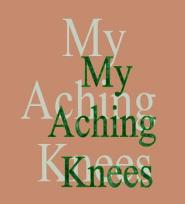.jpg) Tim wrote into MyAchingKnees with this comment and question: "Well thanks for such a nice blog. It's precise and to the point. I'm looking for some glucosamine supplements for my dog and I came across a couple of sites which said that human glucosamine could not be give to dogs because it might be harmful to them. I've checked out a new glucosamine supplement at Amazon but I'm not sure if I can give it to my dog without consulting the vet....can you please help me?? "
Tim wrote into MyAchingKnees with this comment and question: "Well thanks for such a nice blog. It's precise and to the point. I'm looking for some glucosamine supplements for my dog and I came across a couple of sites which said that human glucosamine could not be give to dogs because it might be harmful to them. I've checked out a new glucosamine supplement at Amazon but I'm not sure if I can give it to my dog without consulting the vet....can you please help me?? "
MyAchingKnees response: Tim, you are an animal lover same as me. Most people won't even give their dog's the recommended vaccines let alone provide them supplements as needed or indicated.
I have given three of my dogs Glucosamine. Even though my Vet recommended Rimadyl to control joint related pain - this is just masking the symptoms and does nothing to build joint or connective tissue health. Same as when us humans take Motrin or something stronger.
The problem I see with the product (on the Amazon link you sent) which is K9 Joint Relief is that 1 - it contains Chondroitin which does nothing for joint health; and, 2 - it contains MSM which is a natural pain reliever and anti-inflammatory - and I like to minimize pain relievers on my dogs since it can masks the pain and they can injure that joint worse.
The good ingredients on the product are Glucosamine and Grape Seed Extract. Glucosamine is believed by researchers to directly help cartilage health (both heal and build) while Grape Seed extract is a powerful anti-oxidant.
However, unless manufactured under a Pharmaceutical Grade Good Manufacturing Process, the potency and purity of the product are suspect. This product, K-9 Joint Relief, advertises that they are made under GMP which is a food grade process and not guaranteed. They also list that they are FDA inspected,..no kidding everyone is, but are you a FDA registered lab? It looks to not to be the case. They also state they are recommended by Veterinarians. The product I use for myself and my dogs are recommended by over 100 Vets, most prominently Drs. Rick Lusk and Scott Echols in Texas.
For my joints I take three tablets a day of totaling the following nutrients and doses: Glucosamine (1500 mg), Vitamin C (225 mg) , Manganese (5 mg), Magnesium (43 mg), Potassium (94 mg), and Meriva (Bioavailable Curcumin) (247 mg). On a couple of my dogs, I give one tablet per 40 lbs of body weight. One dog gets two tablets a day the other dog, just one tablet.
Even if the K-9 Joint Relief and what I take were the same quality, I pay $27.95 for a 28 day bottle and the K-9 Joint Relief is $37.95 for what would be a 32 day supply for me.
If you are interested in seeing more about the product I take, contact me back with your e-mail and I'll send you a video and a pdf file explaining how nutrients can help joint health. Oh, the picture at top is one of my dogs who is on the supplements. He's about 70 lbs and lays on the couch during the day time, and in bed with my wife and me at night...in between naps, which is 80% of the dog's life as you know, he chases rabbits.


